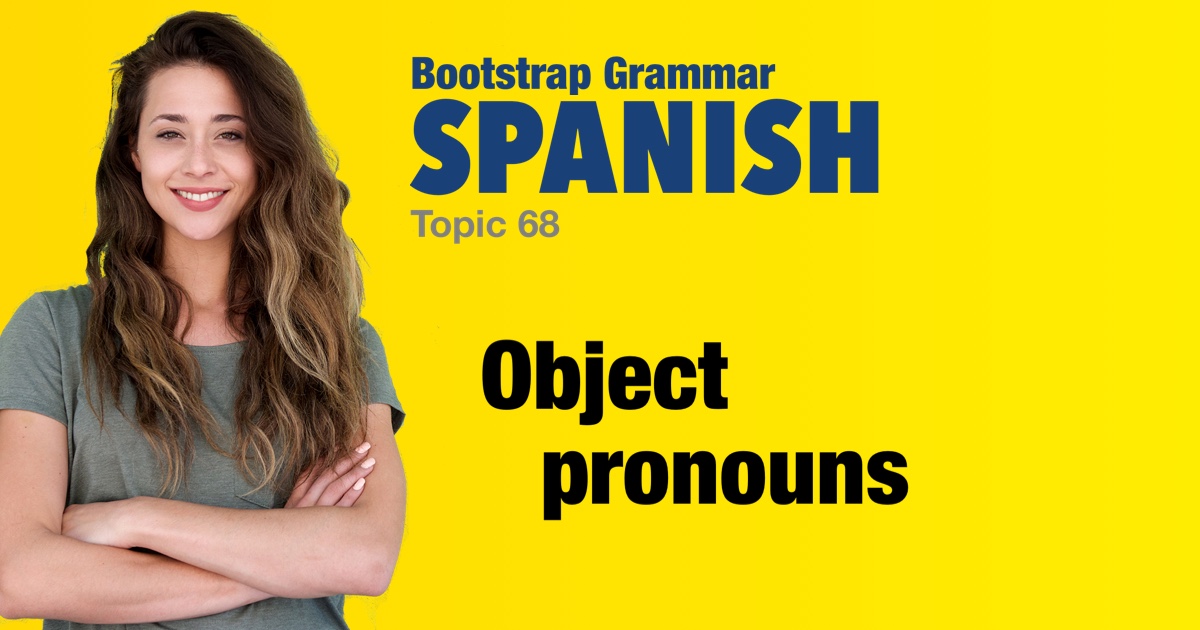Spanish grammar - Object pronouns |
|||
|
|||
The personal pronouns (yo, tú, él, etc.) refer to the person or people who are the subject of a sentence. When referring to a person, animal, or thing that is the object of a sentence, we use a (direct) object pronoun. The Spanish direct object pronouns are: • yo ⇒ me: 'me' • tú ⇒ te: 'you' (familiar) • él, usted ⇒ lo: 'him' or 'it' (masculine); 'you' (formal) • ella, usted ⇒ la: 'her' or 'it' (feminine); 'you' (formal) • nosotros, nosotras ⇒ nos: 'us' • vosotros, vosotras ⇒ os: 'you all' (informal, plural) • ellos, ellas, ustedes ⇒ los, las: 'them'; 'you all' (formal) For inanimate things ('it'), whether we use lo or la depends on the grammatical gender of said object. The object pronoun comes immediately before the verb that acts upon it. |
| Examples: | |
|
Lo veo todos los días.
(I) see him every day.
|
|
|
Nos entienden muy bien.
(They) understand us very well.
|
|
|
Tengo la llave. ¿Tú la quieres?
I have the key. Do (you, familiar) want it?
|
|
|
El libro está en español. ¿Usted lo entiende?
The book is in Spanish. Do you (formal) understand it?
|
|
|
Él es el maestro. Lo escucho con atención.
He is the teacher. (I) listen to him carefully.
|
|
|
Ella es mi hermana. ¿Tú la ves?
She is my sister. Do you (familiar) see her?
|
|
|
La señora Gómez es su tía. ¿La conoces?
Mrs. Gomez is his aunt. Do (you, familiar) know her?
|
|
|
Estoy aquí. ¿Tú me ves?
(I) am here. Do you (familiar) see me?
|
|
|
¿Dónde estás tú? No te veo.
Where are you (familiar)? (I) do not see you (familiar).
|
|
|
Ellos son ingleses. Nos entienden.
They are English. (They) understand us.
|
|
|
¿Tú lo haces? ¿Lo vendes en el mercado?
Do you (familiar) make it? Do you (familiar) sell it in the market?
|
|
|
La amo.
(I) love her.
|
|
|
¿Quién es usted? ¿Yo lo conozco?
Who are you (formal)? Do (I) know you (formal)?
|
|
|
Soy el padre de Juan. ¿Tú me conoces?
I am Juan's father. Do you (familiar) know me?
|
|
|
¿Es él sordo? No nos responde.
Is he deaf? (He) does not answer us.
|
|
|
El poema es extraño. No lo entiendo.
The poem is strange. (I) do not understand it.
|
|
 |
|


 él ⇒ lo
él ⇒ lo
